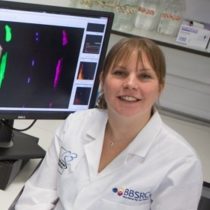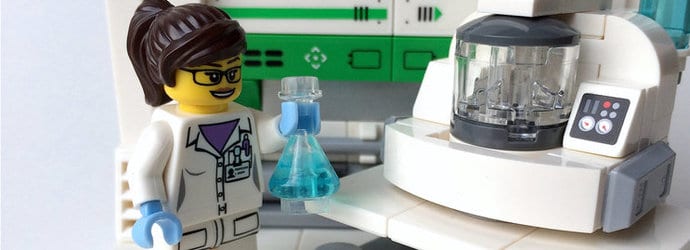I have been working and managing flow cytometry core facilities in Cambridge for 10 years and I would like to share with you some of my experiences. I have worked up the career ladder in the past 10 years and in 2012 I became the Head of Flow Cytometry at Babraham Institute. This means that I manage a large flow cytometry core with 3 sorters, 4 analysers and 3 staff members and over 100 users from the Institute and surrounding Biotech companies. I am in charge of the budget, accounts, and day-to-day running of the lab as well as liaising with different scientists about how flow cytometry can be used in their projects.
The day-to-day job:
Working in a core a facility there has to be a degree of flexibility to your day, especially when people have last minute samples. This can work in your favor as you can work flexible hours. However, it’s important that all the cytometers are switched on first thing in the morning, usually around 9am. They have to be on, warmed up, and checked over before a long day in the Cytometry core. This means that if there are any problems we have plenty of time to troubleshoot, solve, call engineers, and work miracles before the scientists are ready with their samples. In my core, the flow cytometry analysers are available for trained users 24 hours a day. However, the cell sorting service is available from around 10am-6pm.
I do regular one-to-one training on analysers with new staff/students and the occasional sort to keep my hand in. My work involves answering a lot of emails, usually enquiries about how to design a flow experiment or someone asking for some flow cytometry advice. I also have written and regularly teach a flow cytometry theory course, which keeps me very busy. I am very involved with the flow cytometry community, so I am often doing a lot of work towards an event. I am currently helping to organise a hands on practical flow cytometry course, which involves a lot of emailing and co-ordinating of people. It helps to have good organization skills (well, apart, from my messy desk). An important aspect of this job, and in fact any core facility role, is to keep up to date with all the technology. Flow Cytometry is constantly evolving so it’s key to read the relevant papers, mailing lists, and attend relevant courses and conferences.
How did I get here:
During my PhD, I learned a lot about flow cytometry and how to use a sorter. I chose to do this as a career as I really enjoyed the technique. I found all of the cytometrists that I met really friendly and helpful. Throughout my career, I have been fortunate enough to be helped by some wonderful mentors. My advice to anyone embarking on a career in a core facility, or in fact any career in science, is to find a really great mentor.
How can you get my job:
My advice to anyone wanting to become a core manager is that it can take time, as you need to ‘learn your trade’. Take all opportunities that come your way. Be seen at meetings, especially the local meetings. Talk to people and volunteer for things such as chairing sessions at meetings. This way when your perfect job comes up, you are already known in the field and it makes it a bit easier. Another thing I did was that I visited other people’s labs. This way I had experience in lots of labs and could work out how I would like to set up and manage a core facility. I am afraid that there will be many years of doing a lot of sorting (I sometimes did 9 hours a day of sorting green cells), but it is worth it to get a good job.
You don’t need a PhD to be a core manager, although it can be helpful. Especially when talking to students and PIs. To start working in a core facility, you might need to start as a technician/assistant, but you can work your way up quite quickly.
To manage or a core facility or in fact to work in one, you must have patience, as people are often late and don’t come with the correct controls despite already been told what to bring with them. You must also be able to prioritise your work, and be flexible to be able to drop everything to mend a machine or help a user. A core job is ideal if you don’t want your own research project but you would like to get involved with loads of other people’s work.
‘With great power, comes great responsibility’
There are some drawbacks to working in a core. Your day-to-day work is often reliant on people bringing their samples on time. Also, sometimes it can get a bit repetitive and boring – but hey can’t every job. You don’t get the research thrill that you get from your own research, but, then again, you don’t get those lows either. Working in a flow cytometry core we are often the final step in a potentially long process of growing up cells, etc. Therefore, there can be pressure to get it right. This means that the core is often the ‘easy’ person to blame when things go wrong. You often have to deal with stressed people and be an agony aunt to them.
Good side of working in a core:
It is more of a 9-to-5 job than the hours you do as a research scientist. However, you often have to work through your lunch to fit in a sort. One good part of this job is that your career progression frequently isn’t reliant on publications and you often have a longer contract than a research scientist. In fact, many core facility jobs come with a long-term or permanent contract. You will often find that you are paid more than a scientist. You can also get involved with lots of different projects.
If you think you want to work in a core facility, then my advice is to visit your local core and ask if you can shadow them for a few days/weeks to see if this the job for you. I really love working in a core facility, but it has been a lot of hard work to get where I am.






